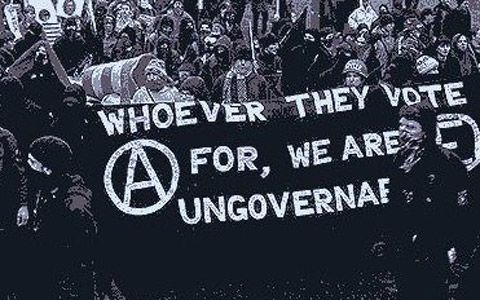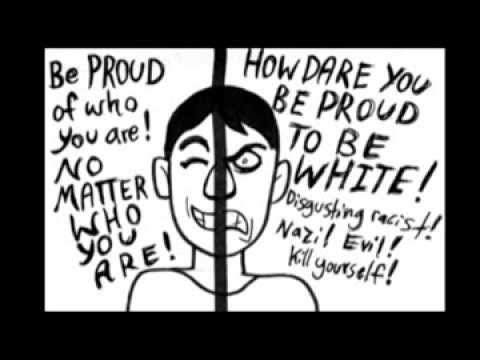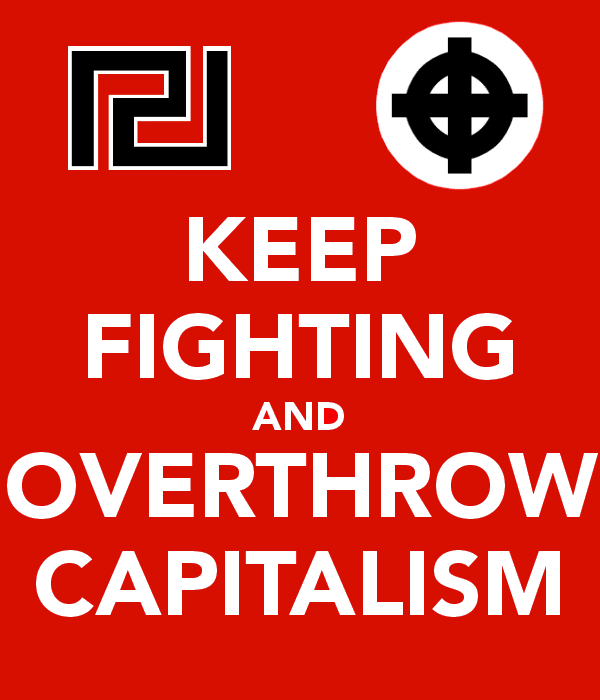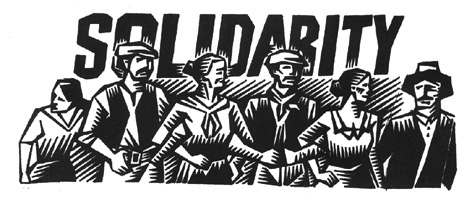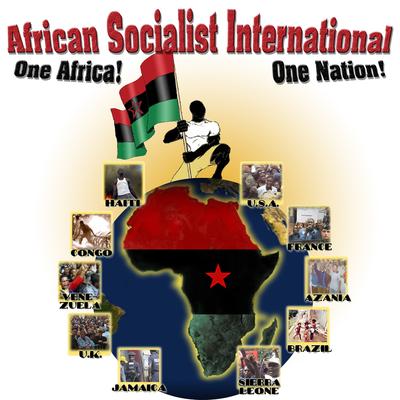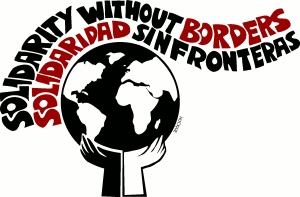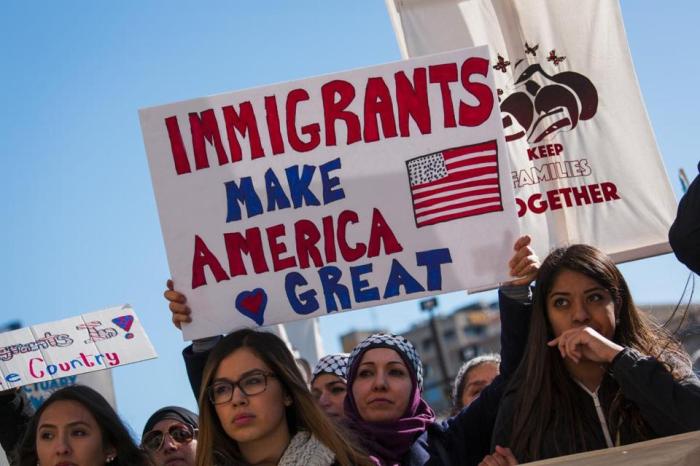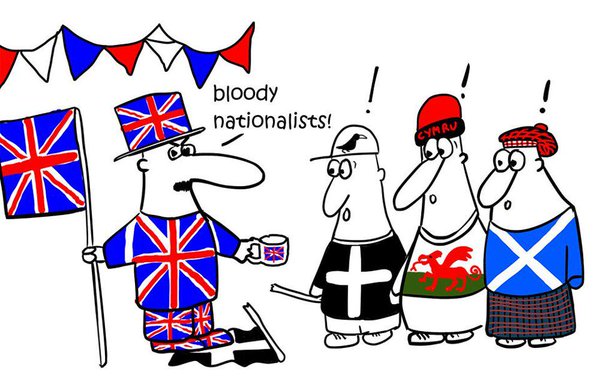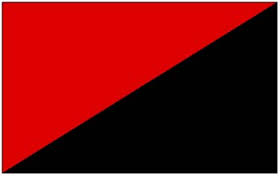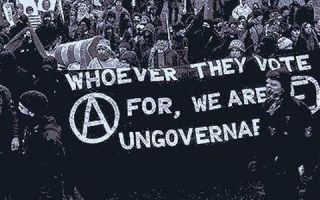Many so-called ‘Anarchists’ have been deriding those of us who decided to campaign for the Remain side in the EU referendum, and especially those of us who have decided to get involved in Momentum (the organisation within the Labour party that supports Jeremy Corbyn and the Left-wing ideas he represents) – without actually suggesting any alternative course of action for the Left or the Anarchist movement. A holier-than-thou attitude has been levelled at us for the past few months and in this article I want to attack this attitude head-on, by looking into the historical and philosophical roots of anarchism itself.
The basic point I want to make is that Anarchism is a completely irrelevant set of ideas unless those ideas are actually being used in political struggles of the working class. If Anarchists are not working as part of broad working class movements which involve other people of different perspectives, we will not achieve anything.
Anarchists who do not participate in such movements but instead stick to their own organisations or informal ‘scenes’, are not fighting for Anarchism, even if they think they are. Anarchism is not supposed to be a sub-culture of people attempting to ‘drop out’ of the capitalist system and refusing to engage with ‘politics’. It is supposed to be a set of ideas on tactics for the revolutionary movement of the working class to destroy capitalism and create socialism. Refusing to engage with ‘politics’ means refusing to engage with working class struggle.
The sub-title of this article is a tongue in-cheek reference to Lenin’s 1920 pamphlet ‘Left-Wing Communism: an Infantile Disorder’ in which he basically attacked all the left-wing movements around the world that refused to obey him. Many anarchists were among those of course, and some of us have proudly called ourselves ‘Left-Communists’ as a result. So what is the difference between Marxist-Leninism and Left (or anarchist) Communism? This is important to establish first, before we go on to discuss the difference between Left-wing anarchism and other types of anarchism.
Anarchism and The Communist Manifesto
For an answer we must go back even further in history to the first philosopher to call himself an Anarchist – Pierre-Joseph Proudhon, who also called himself a Socialist and advocated that the working class organise separate political parties to run in elections to fight for their own interests. Proudhon lived during times of mass working-class struggle in France, where he lived, in the 1830s and in the 1848 revolutions which swept Europe, and was himself a skilled worker, born into poverty but who had taught himself to read and write. The famous phrase ‘Property Is Theft’ comes from his book ‘What is Property?’
Proudhon was a sexist, and in many other ways his views would not reflect those of modern-day anarchists or Left-wing people, but he did make important contributions to political theory, including the theory of Class-struggle itself. For him socialism meant the working-class struggling in its own interest, and eventually replacing capitalism and the State with a completely different system which he called ‘Mutualism’. Mutualist ideas became very popular among the working class throughout the 19th century and led to the formation of many workers’ cooperatives, credit unions, building societies and other examples of non-capitalist ways of organising the economy to give more freedom and equality to workers.
Proudhon was a big influence on the two leaders of the factions that eventually split the socialist movement into the Marxist and Anarchist camps that continue to this day – Karl Marx, and Mikhael Bakunin. Marx actually had a lot of philosophical problems with Proudhon and wrote a response to his book ‘The Philosophy of Poverty’, called ‘The Poverty of Philosophy’. Classic Marxist humour, and why to this day Marxists have such a reputation for being such a fun-loving, carefree bunch of jokers.
It’s important to remember that at this time there were no Anarchists and no Marxists- everyone just called themselves Socialists. So when in 1848 at the height of the international workers revolutions, Marx with his wealthy factory-owning mate Engels wrote ‘The Communist Manifesto’, anarchists would not have automatically turned their noses and refused to read it because it wasn’t punk enough, but might have actually read it, or had someone read it to them as working-class people were still mostly illiterate at this time.
There are a few quotes from the Manifesto that I want to introduce here, because they are important in showing just how little Marx and Bakunin actually disagreed on important points (indeed some have even claimed that Marx should be considered an Anarchist himself). These quotes are from the section called ‘Communists and Proletarians’:
‘The Communists do not form a separate party opposed to the other working-class parties.
They have no interests separate and apart from those of the proletariat as a whole.
They do not set up any sectarian principles of their own, by which to shape and mould the proletarian movement.
The Communists are distinguished from the other working-class parties by this only: 1. In the national struggles of the proletarians of the different countries, they point out and bring to the front the common interests of the entire proletariat, independently of all nationality. 2. In the various stages of development which the struggle of the working class against the bourgeoisie has to pass through, they always and everywhere represent the interests of the movement as a whole.’
These statements might seem surprising to those familiar with the history of how groups of people calling themselves ‘the Communist Party’ have actually behaved during the twentieth century. Nonetheless, Marx and Engels clearly say that Communists should not try to control anyone, merely point out that working class people everywhere, regardless of nationalities have the same interests.
For example if you’re an activist campaigning against austerity and you argue with someone who might be banging on about foriegners taking all the jobs by saying that we should all support each other, that makes you part of ‘The Communist party’ in the sense written in the manifesto, even if you are not part of any actual organisation at all. This makes most anarchists ‘communists’ by this definition, as we are internationalists.
The manifesto goes on to say:
‘the first step in the revolution by the working class is to raise the proletariat to the position of ruling class to win the battle of democracy.
The proletariat will use its political supremacy to wrest, by degree, all capital from the bourgeoisie, to centralise all instruments of production in the hands of the State, i.e., of the proletariat organised as the ruling class; and to increase the total productive forces as rapidly as possible.‘
This is the famous idea of the ‘dictatorship of the proletariat’, an phrase that has an equally bad reputation as ‘The Communist party’. But notice, that Marx and Engels have already explicitly said that Communists shouldnt take over the working class, so they clearly are not advocating the Communist party take over the State and institute a one-party dictatorship, as many ‘Communist parties’ have actually done in real life.
In fact the Manifesto seems to be using the word ‘State’ to mean something compltely different from what we normally mean by it in every day language, and from what anarchists mean by it when we say we don’t believe in the State. This is classic Marxism once again – being bloody confusing and redefining words willy nilly for no apparent reason, almost as if they don’t actually want any ordinary workers to understand what they’re on about!
What the Manifesto is saying here is that the working class people should be organised into some kind of big organisation and that this organisation should nick all the money from the bosses and bankers as well as take over all ‘instruments of production’ which would mean the farms, factories and everything else used to produce things we need.
This organisation is what they are calling ‘The State’, and they are saying it must use violence to achieve it’s goals, but this will be an organisation of the vast majority of people – the 99% as we would say today – using violence to take control of everything from the 1%- or ‘bourgeoisie’. By calling it a ‘State’ Marx and Engels seem to be just using their bloody anoying sense of humour whereby they just try and turn the meanings of words on their heads – a habit Marx must have picked up at University when he was studing Hegel.
People familiar with the history of Anarchism in the trades union movement, especially the CNT in Spain or the IWW in the English-speaking world, will probably realise that what Marx called the ‘State’ is actually exactly the same as what the IWW called the ‘One Big Union’, and what the CNT actually achieved in Barcelona and other places in 1936-7 is remarkably similar to what the Manifesto says should happen under the ‘dictatoship of the proletariat’, even though they didn’t call it that.
The CNT union in Spain took up arms to fight the capitalist class, who were backing the Fascist army of General Franco, and it had so many workers and peasants organised that the union was able to take over many work-places, farms, factories, train-lines etc – doing what the Manifesto said they should do ‘centralise all instruments of production in the hands of the State’ if of course you define the ‘State’ as the organisation of the working class, in this case, the CNT.
Finally the Manifesto says:
‘When, in the course of development, class distinctions have disappeared, and all production has been concentrated in the hands of a vast association of the whole nation, the public power will lose its political character. Political power, properly so called, is merely the organised power of one class for oppressing another. If the proletariat during its contest with the bourgeoisie is compelled, by the force of circumstances, to organise itself as a class, if, by means of a revolution, it makes itself the ruling class, and, as such, sweeps away by force the old conditions of production, then it will, along with these conditions, have swept away the conditions for the existence of class antagonisms and of classes generally, and will thereby have abolished its own supremacy as a class.‘
Again, they are mucking around with words a bit too much here and causing unnecessary confusion – which is serious as it has led to the death of millions of people in Russia, China and elsewhere. They are defining ‘political power’ as the violence carried out by one class against another. Right now the 1%, because it controls the State, is using violence against the 99%, in the form of the police, prisons, bailiffs, security guards, armed forces, secret services etc etc, to keep the system going. This is something that anyone can see, although many working class people still don’t see things in this way and perhaps think that the existence of this kind of State violence exists for the reasons that the 1% say it does – for ‘Justice’ or ‘the Rule of Law’ or whatever it is they say.
Because Marx and Engels were influenced by Hegel, who liked to play little logic games called ‘dialectics’, where you juxtapose ideas with their opposites in order to bring up contradictions that need to be resolved by inventing new ideas, they feel it is necessary to invent an idea called the ‘workers State’, or ‘99% State’ to talk about the idea of the 99% getting organised enough to fight back against the power of the 1% State and take over the means of production.
For most of us, who can’t be bothered to play these kinds of games with words, it would have been better if they just hadn’t used the word ‘State’ at all, but just said ‘the organisation of the working class’ and had just said ‘violence’ instead of ‘political power’. Its clear that the Manifesto is aimed at a world where there is no State at all, because it says in the passage above that once the violence of fighting the capitalists for control of the means of production is over, there is no need for any violence or ‘political power’ ever again.
So if anarchists and the original Marxists agreed on all of this, just using different words to describe it, why did they split at all? Why didn’t the whole socialist movement become the united force of the whole working class, destroy all the capitalist governments and bring about a totally different society where everyone controls the means of production together, sharing the work that needs to be done, and the products of that work fairly, according the principle ‘from each according to their abilities, to each according to their means?’ Why did capitalism and State oppression continue for another 170 years, even to this day?
The Split Between Anarchists and Marxists in the 1st International
Lets go back to the history lesson. In 1861 Marx helped to organise the first meeting of the International Working Men’s Association (note the sexism) which is sometimes called the ‘First International’. This organisation invited representatives from militant working-class organisations from all over Europe and was the first time that working-class people had had any kind of international organisation. In theory it should have been the beginning of the global organisation to unite the working class and bring about the revolution, so what went wrong?
The Marxist version of the story is that an Anarchist called Mikael Bakunin kept trying to use manipulative and undemocratic ways of doing things until the Marxists were so pissed of that they felt they couldn’t carry on, so they dissolved the organisation and starting their own Marxist organisation, known as the 2nd International.
The Anarchist version of the story is that Marx and his friends tried to change the structure of the organisation so that it would be a hierarchical one with a central committee of people who all agreed with everything Marx said. Bakunin thought that the organisation of the working class should not have a hierarchical structure because if it did then after it took over all the means of production from the capitalists, there would simply be a new ruling class made up of the Marxist leadership of the organisation. Bakunin tried to stop Marx from doing this, and would have succeeded if Marx and his friends hadn’t used manipulative and undemocratic means to force the anarchists out by dissolving the International. The Anarchists then started their own International as well.
If you really care about who was in the right and who was being sneaky, you can go and read all about it for yourself. I am prepared to believe that both sides probably were being a bit sneaky, but that ultimately Bakunin was proven right about the danger of hierarchical organisation by what happened in Russia and other places later on.
Bakunin also disagreed with Marx in other ways which history has proven him right on. For Marx, the ‘working class’ meant the industrial workers in the big cities, and he didn’t talk much about the peasantry in the countryside, self-employed small business owners or the people without jobs such as beggars or criminals. Bakunin on the other hand thought you needed them all to be united as Socialist revolution would benefit them all. History has proven him right especially in the sense that most big socialistic revolutions in the twentieth century were more based on the organisation of the peasantry than of industrial workers.
The main difference between the organisations that have their origins in Marx’s 2nd International and Bakunin’s Anarchist International is that the Marxist organisations have mainly taken the form of political parties where as the anarchist ones have mainly been trades unions and other organisations that do not act like political parties, such as the various ‘Anarchist Federations’ or ‘Libertarian Communist’ organisations that have existed throughout history.
Broadly speaking it was mostly Northern European countries, especially Marx’s native land Germany were Marxism really took off, and mainly Mediterranean countries where Anarchism did better. In Germany, millions of workers eventually became members of the Marx-inspired Social Democratic Party (SPD) that did eventually achieve a revolution in Germany in 1918, ending the First World War. The SPD did not just run candidates for elections to the German parliament, it also organised youth clubs, music groups and many other cultural activities that helped build up a strong sense of working class solidarity and socialist culture that you can still see many traces of in Germany today.
But the SPD revolution of 1918 did not lead to Socialist revolution. The SPD-led government signed a Peace treaty with Britain, France and the US called the treaty of Versailles which committed the State to giving away lots of territory and paying a ridiculous amount of money to its former enemies, causing a lot of the popular resentment which the Nazis were later able to capitalise on to take power and destroy the workers movement altogether, much to the satisfaction of capitalists all over the world, who only decided Hitler was a bad guy many years later.
So what went wrong? According to ideas in the Communist Manifesto, the SPD should have told the Allies to shove the Treaty of Versailles, and carried on with fighting the capitalists until all the land, factories and other means of production so that they would now belong to the working class. Instead the leaders of the party sold out the working class, which can perhaps be seen as a vindication of the Anarchists distrust of hierarchical organisations.
If there are no leaders, there’s no one who can sell anyone else out! I learnt this very early on when I first got involved in activism and the cops asked us who was in charge. We just told them no-one was, so they were just confused, couldn’t take anyone off for a private chat, and we carried on doing what we were doing. The same thing has happened many times in my experience of non-hierarchical organisations.
Anarchism vs Marxist-Leninism
Many workers in the SPD who were still committed to the ideas of Marx and the 2nd International split off and formed the Independent SPD, but others joined the newly formed Communist Party, which was part of the 3rd International that had recently been formed in Russia by the Bolshevik faction of the Russian Social Democratic party led by Lenin.
The Bolsheviks had formed their faction after lots of arguments with the other Marxists in the SPD, who were called the Mensheviks. The word ‘Bolshevik’ means majority and ‘Menshevik’ means minority, because they had originally split in a vote where Lenin’s ideas had won the vote, but actually for most of the time until the Russian revolution actually started the Bolsheviks were in the minority of the Russian SPD, which was a tiny organisation in Russia anyway.
The Russian revolution of 1917 was very different from the German one the next year. It did not come about because the majority of workers were organised into a 2nd International-style Marxist party. Instead, the peasants and unemployed in the cities had played big roles, alongside the industrial workers, who were a tiny minority of the population in a country with very little industry.
One of the biggest organisations were the Social revolutionaries, who were calling for the peasants to have control over the land. Anarchist ideas were also popular among many revolutionaries in Russia, and many of the most famous Anarchist philosophers were Russians (or at least from what was the Russian Empire at the time): Bakunin, Kropotkin, Emma Goldman, Nestor Makhno, and others.
On International Women’s day in March 1917 (February according to the old calender that Russians used at the time), masses of working class women took to the streets demanding food, as the First World War had caused widespread hunger and hardship for years, as well as the deaths of millions on the front lines. The women stayed in the streets for four days and were gradually joined by many male workers as well. The soldiers who were ordered to shoot the protesters refused to, because they were sick of the war as well, and the Emperor (Czar) realised he was beaten and decided to give up power.
All over Russia workers and peasants started taking over the ‘means of production’, especially the land, and started organising their own local systems of government called ‘Soviets’, or ‘councils’, based on direct democracy. It seemed like a socialist revolution was happening without the masses even needing to be organised into a hierarchical political party. Instead the ‘soviets’ seemed to be the organisation of the working class that was going to fight the capitalists, take over all the rest of the means of production, and bring about socialism and the end of the State (or to be the ‘workers state’ in the sense used by the Communist Manifesto).
The majority of the Marxists (the Mensheviks) were too stuck in their old 2nd International ways to be able to figure out what to do about this, but Lenin saw a chance to use this new situation to his advantage. His Bolshevik faction united with some anarchists and succesfully attacked the headquarters of the new government that capitalists had formed in St Petersbourg in November 1917 (or October in the old Calender, which is why its called the October Revolution or Red October).
Part of the reason that the Mencheviks had not known what to do, is because they were confused by Marx’s philosophical nonsense about the ‘dialectics of history’ and theory that history moves through different ‘stages’. Marx thought capitalism was actually pretty cool in some ways, because he thought that it had led to lots of technological progress which otherwise wouldn’t have happened. He saw that the technology that capitalists had invented because of competition with each other had meant that more things could now be produced easier than before.
If workers took over this technology and used it in a socialist way, then the new socialist society would be able to produce lots of stuff without workers having to work that hard, which would be great. For some reason he didnt think it would be that great if peasants just took over the land in places where capitalist industrial revolutions hadnt happened yet and figured out how to develop the new technology for themselves later on in their own time.
Instead, many Marxists seemed to think that peasants living in old-school feudal systems should wait for capitalists to have their revolution first, creating big factories with new technology and make them all into wage workers in industry for a while first. Only after this were they allowed to have their own revolution.
Its a mad bastard of an idea, and one that obviously no peasant would really be that convinced by. Unsurprisingly Marx had never been a peasant or an industrial worker himself, or even had any friends who were. However, the idea that Lenin replaced this with was even madder.
Lenin not only didn’t have any peasant friends, he actually had peasants working for his family, which was part of the aristocracy, and like other aristocrats he viewed peasants with contempt, which was one of the reasons he liked Marx’s theory of stages of history.
Lenin completely changed the idea of the ‘workers state’ to one completely different from how an Anarchist would interpret it in the Communist Manifesto. He said that in countries like Russia were feudualism was still more common that industrial capitalism, then the workers State should do the job of creating capitalist-style industrial development, using State force to bring about the ‘Capitalist stage’ in history, and then moving straight on to the ‘Socialist stage’.
It makes so little sense I find it hard to even explain. If the communsit manifesto talked about the workers ‘State’ being basically an organisation like the CNT or IWW, an organisation of all the working class that took over the means of production and wealth of the capitalist class, and once those battles were over just ceased to exist, then the State that Lenin was imagining was clearly something very different.
Of course Lenin agreed with Marx that this organisation needed to be hierarchical. But not only this, it needed to have a huge amount of power and top-down authoritarian control in order to bring about a capitalist style system – even more power than the States which had brought about capitalism in other countries had actually had in the first place. It also needed to stop the peasants having their revolution where they took control of the land for themselves, until the ‘right time’.
So, even though by organising themselves into Soviets, the working class (in the broader sense that Bakunin used, to include the peasantry as well) had already formed the organisation that was bringing about Socialism, Lenin felt the need to get his party to take over all the Soviets, ban all other political, and make the ‘Political Bureau’ of the Bolshevik party (now called the Russian Communist Party) into the unelected government of the whole Soviet Union. The ‘soviets’ were turned from being local councils based on direct democracy where workers and peasants would organise their own affairs, into just being the bottom level of a massive hierarchical system of government which Lenin himself was at the top of.
Peasants, industrial workers and anyone else who opposed them, including Anarchists, were shot to death or put in prison. Peasant villages were forced to give up their food at gun point to the goverrnment, which was led mainly by former Artistocrats and middle class Marxist intellectuals, as well as criminal thugs like Stalin, who simply did well in a structure based on violent domination.
Drunk with power, Lenin decided that any Marxist, or indeed any Socialist, anywhere in the world, who disagreed with him, was an idiot, which is why he wrote ‘Left-Wing Communism – an Infantile Disorder’. He set up a new Third International, called the Communist International, and told all the old Second International parties they should join it. ‘Left Wing Communism’ was partly an attack on those who refused, and partly an attack on those who did join but who he thought complained too much.
So now there were dozens of organisations called ‘Communist Parties’ which were completely different from how the Communist Manifesto said a hypothetical ‘Communist Party’ should behave. The 3rd International Communist Parties believed in trying to take over the working class and in creating a brutal dictatoship, copying what had happened in Russia, using baffling Marxist philophical jargon to explain to workers how it was in their interests to support them.
The 3rd International parties became basically just organs of the Russian State, especially after Stalin took over the Party after a power struggle between him and Trotsky once Lenin died. Trotsky formed his own rival ‘4th International’, which all the Trotskyist parties have their origins in.
Of course, in those days there was no internet, so workers around the world didn’t know what was really going on. The capitalist newspapers were of course saying horrible things about Lenin and the Bolsheviks, but many workers new that the capitalist papers were full of lies. So many believed the Marxist-Leninist propanganda which said that Lenin had come up with a brilliant new theory for how to achieve socialist revolution, and that socialist revolution was really happening in Russia.
Thousands of people who until then had been more influenced by anarchism than Marxism all joined the new Communist Party, because they believed this propaganda. A few anarchists like Emma Goldman, Alexander Berkman and Kropotkin himself, as well as anarchist peasant refugees like Nesto Makhno, did know what was really happening because they’d seen it with their own eyes, and tried to warn workers not to buy into Lenin’s lies, but the Communist International’s newspaper, the Daily Worker, was read by a lot more workers.
Anarchist alternatives to Marxist and Leninist tactics
Before the Russian revolution, anarchist ideas were a lot more popular within the socialist movement than Marxist ones in most countries. Anarchist ideas spread rapidly throughout Europe, Latin America, North America, Australia and parts of Asia, especially Japan, Korea, China and India. Often it was spread by migrant workers who had become introduced to the ideas in one country before moving to another and spreading them, such as Malatesta who started off in Italy before moving to Argentina, as well as other European countries.
As I mentioned above, most of the biggest organisations influenced by Anarchist ideas have been trades unions such as the IWW, or CNT, though it is interesting to note that the unions themselves did not require people to declare their loyaty to anarchist theory before joining. In the CNT, for example, there was an explicitly anarchist organisation called the FAI, or Anarchist Federation, which was much smaller, and you didn’t have to join FAI to join the CNT.
This is an important point: anarchists realised that they would be more successful in building mass movements if they made them open to people who didn’t necessarily agree with anarchist ideas straight away. The important thing was to organise the working class for socialist revolution, not to win converts to a theory. When you look at the the history of Marxism by comparison, this is quite striking, as Marxists have tended to place a lot more importance on having lots of theorectical arguments, splitting off from each other when they have disagreements.
It is easy to understand why more workers would be interested in joining a union that was militantly fighting for workers interests and which didn’t ask them to read loads of books before they joined, that they would be in joining a political party where everyone was always using really long words and phrases that no-one else ever used in any other context.
But the strategy of building these kinds of unions – known as the Anarcho-Syndicalist strategy – was not the only strategy that anarchists tried. Bakunin thought that revolutionary socialists should always support popular rebellions by working class people, including peasants. When the working classes of Paris rose up in 1871 and organised themselves into a new organisation based on direct democracy called the Paris Commune, fighting the capitalists and their soldiers to do so, Bakunin went there to join in, and he also wanted socialists to support the independence struggles of the Slavic peoples of Eastern Europe agaisnt the Russian Empire.
For Bakunin, then, spontenaity was important. Building up organisations of the working class was one thing, but so was building up a culture of resistance and the confidence of the people in their ability to fight for freedom. You couldn’t just ignore people who were fighting for freedom because they were doing so in a way that didn’t fit in with your theory, you always had to be on the side of the oppressed whenever they fought back. Once you were there, side by side on the barricades or whatever, then they might be interested in hearing about your ideas of international working class solidarity and socialist revolution. Marx disagreed, and did not go to Paris for to help the Commune, nor did he support the struggles of the Slavic peoples, giving abstract philosophical reasons for staying at home in London with his middle-class intellectual friends.
Towards the end of the 19th century there was a decline in the Socialist movement all over Europe, and many younger Anarchists were frustrated at the lack of militant action to get involved with. This led many of them to adopt a strategy of terrorism, inspired by the Russian Nihilist movement of a few decades before. The Nihilists did not have a positive image of what should replace the Fuedual Russian Empire, they just wanted to see it destroyed. Nihilists carried out acts of terrorism including assasinating the Csar. Lenin’s older brother had actually been a Nihilist, which was why his chances of feeding his lust for power by simply working within the system like a normal aristocrat had been ruined at a young age.
Anarchists did have a positive idea of the society they were fighting for, but it required the working class to be organised and to be militantly fighting. Some of them thought that as the Nihilists had been successful in making people realise the Czar was not all-powerful by the fact he could be killed, maybe anarchists could get the rest of the workers to rise up by assassinating capitalists and governments that supported them.
There were many bombings and assassinations in the late 1800s and early 1900s carried out by anarchists, none of which led to socialist revolution. What they did lead to was anarchists getting a bad name in the press ever since, and the association of the word ‘anarchy’ with chaos and violence in many people’s minds. The stereotype of anarchists as people with big beards dressed in black and chucking bombs was based on the fact that many of these kinds of people did actually exist at the time, though even then they were a minority of the anarchist movement.
After this period, in the early twenieth century, this strategy of anarchism terrorism became less popular, as it clearly didn’t work, and thats when the anarchist-inspired trades unions really started to grow. Bakunin had warned that normal trades unions were counter-revolutionary as they were hierarchical, so the leaders could always sell out the workers, and also because they were usually only interested in the issues of particular workers in particular industries, not the whole working class. Bakunin saw normal trades unions as counter revolutionary, because workers in a particular industry would only care about getting on good terms with their boss, not about overthrowing the whole system for the benefit of the whole class.
Anarcho-syndicalists therefore decided to organise unions which would take in workers of all different industries, that would fight for the interests of workers in each industry while at the same time emphasising the need for all workers to be in solidarity with each other, regardless of nationality or industry, and for one day to overthrow capitalism altogether. In doing so they were truly living up to the idea of what the Communist Party should be, as defined in the Manifesto.
But anarcho-syndicalism was not the only successful anarchist strategy. In Mexico a group of Anarchist Communists infiltrated the largest political party, the Liberal Party, and took it over, turning it’s party newspaper into a mouth-piece for Anarchist-Communist propaganda.
The leader of the Party at this time was Ricardo Flores Magon, who was of indignous decent but was born into a middle-class family and became a lawyer representing mostly poor indigenous and mestizo (mixed heritage) peasant farmers in court, which radicalised him. He was in communication with members of the IWW in the United States, including Emma Goldman, and read the works of Kropotkin and other Anarchist Communist writers.
By inflitrating a non-revolutionary party and turning it into a revolutionary one, Flores Magon achieved something quite original in Socialist history, with amazingly successful results. There was an anarcho-syndicalist movement in the big cities of Mexico, which unfortunately had similarly dismissive ideas about the peasantry to many Marxists. Flores Magon used the party newspaper to promote the idea of workers and peasants seizing the land at the same time, promoting unity among all the working class (in the sense Bankunin used it).
At the time there were two different revolutionary peasant movements going on – one in the north led by Pancho Villa, and another in the south led by Emiliano Zapata, who famously declared that ‘Whoever works on the land should own it’ and whose slogan was ‘Land and Freedom’. A combination of these movements with the movement of the working class in the cities, brought down the government of the dictator Porfiro Diaz, and a new government calling itself socialist took power.
Flores Magon, and Zapata, did not accept this new government as being genuinely socialist, and kept fighting it and propagandising against it, saying that workers and peasants must never accept the promises of politicians and must directly seize the means of production themselves, rather than letting the State sieze them, even if the politicians controlling the State promise they’ll reform them.
Lenin also thought Socialists should participate in mainstream party-politics as a platform to spread propaganda, but the kind of attitude of the sort of Party Lenin wanted to that which Flores Magon led, couldnt be more different. Lenin wanted a party that would participate in elections in a capitalist state to spread propaganda that the state must be abolished and replaced with a new one based on the rule of his own Party. Flores Magon was simply getting involved in party politics in order to tell the working class not to trust politicians with any power at all and that they should take direct control of the means of production themselves, and never give up control of it to anyone.
The Mexican revolution actually happened before the Russian one, and it is a shame that Flores Magons ideas of how socialists should behave when participating in mainstream politics have not been as widely popularised as Lenin’s have.
Similar things have been done by other anarchists in other places and at other times. In France there was once a Libertarian Communist party which stood for elections, that emerged out of the Platformist tradition of anarchist communism. This tradition was started by Nestor Makhno, who had been a revolutionary peasant leader in the Ukraine and had fought battles against both Lenin’s Bolsheviks and the Capitalist armies that tried to take over Ukraine again.
Makhno’s army had been well organised and disciplined, but had never tried to impsoe any system of government onto the territories which it liberated from various State controls. Instead they simply told the peasants in each place that they were now free to govern themselves however they saw fit and went off to liberate more territory, similar to how Zapata’s army worked in southern Mexico at around the same time.
When Makhno had finally been defeated by the Bolsheviks, he fled to western Europe, where he was disgusted at how disorganised and lacking in discipline the anarchist movement was. He and his friend wrote a text called the ‘Organisational Platform of the Libertarian Communists’ which advocated that anarchists organise themselves into effective structures with clear messages that everyone agreed on, so that they could play a better role in workers struggles and argue for socialist revolution more effectively. Many organisations which have played a major role in spreading anarchist-communist ideas around the world have been inspired by this tendency.
So why do so many anarchists refuse to engage with mainstream politics?
The 1930s were a time of great crisis for the Socialist movement. The Communist Party of Spain, led by Stalin in Russia, betrayed the Anarchists and other Marxists, leading to Fascist victory in the Civil war and the death of many anarchists. The Second world war killed many more. In the 1930s there was an anarchist revolution in Manchuria, China, which was crushed in the war as well. It was not until the 1960s that anarchists emerged again as an influnce in working class politics.
The working classs movement of the 1960s was different from any other. Many Socialists had been shocked at how Fascism and Stalinism had managed to get the support of so many workers, so revolutionary theory started to incorporate more of an analysis of pyschology and culture, with the Frankfurt school of Marxism and such revolutionary counter culture movements as the Situationist International in France, the Provos in Holland, and the Yippies in the United States. Many of the same people were involved in artistic movements as well as radical politics, and there was also a rise in ‘alternative lifestyles’, at which the most extreme end was the hippy drop-out culture of moving to communes and trying to live as if the socialist revolution had already happened.
In the UK in particular, in the late seventies there was a huge social crisis and many working class youth became disenchanted with the Labour party, and party politics in general. The punk movement emerged as a cultural phenomenon, following on from the youth movement of the 1960s, but involving a more nihistic rejection of politics. Anarchism became associated with this movement and many punks began calling themselves anarchists, even if they had no interest in socialist revolution or engaging with mainstream society in any way, let alone mainstream politics. Of course, many socialists, anarcho-communists and trades unionists were also involved in the punk movement, but nonetheless, it is obvious that punk did a lot to de-politicise anarchism and make many people see the word as synonymous with drop-out culture, including many in that drop-out culture itself.
There has always been a philosophical tendency called ‘individualist’ anarchism, originally advocated by Max Stirner in the early 1800s, and more recently there has been a development of a school of thought sometimes called ‘anarcho-primivism’ also based on a rejection of modern technological society, glorifying a hunter-gatherer mode of existence and therefore rejecting the struggle of the working class to gain control of the means of production as irrelevant, or even morally wrong, as they associate technology and the division of labour with oppression. By definition, anarcho-individualism, and anarcho-primitivism are not organised political movements with clear aims, nor are they part of the socialist movement. However, these kinds of ideas may be heard being expressed in many anarchist ‘drop-put’ communities and have influenced the thinking of many anarchists who have not fully bought into them. These philosophies obviously reject participating in mainstream politics for completely different reasons.
Going back to those anarchists who do actually want to see working class revolution, in the 1960s, continuing through the 1980s to the present day, there was a revival of the nihilist-inspired ideas of the anarchist terrorists, with the growth of what is now called ‘insurrectionalist anarchism’, and certain anarchist terrorist groups have spread the idea that by militant action alone anarchists can inspire working class revolution, despite the fact it failed 100 years ago.
Because of the history of animosity between anarchists and Marxists, especially Marxist-Leninists, not only because of the Russian and Spanish revolutions, but also because of many times in which Trotskyists or Stalinists have bad-mouthed or betrayed anarchists, or have sabotaged anarchists’ attempts to inspire people to direct action, in many social movements such as in Paris May 1968, in which Trotskyists were widely seen as being complicit in counter-revolution, many anarchists now have a simplisitic idea that anything that Trotskyists do must be wrong, including participating in mainstream politics.
Anarcho-syndicalists and Platformists, as well as many Marxists have also often ridiculed the idea that real change can ever be achieved by electing politicians into parliaments in capitalist countries, as part of their propaganda efforts to encourage direct action of the workers instead.
Although it is important for revolutionaries to explain to other workers how the system is always rigged to suit capitalists, and that ultimately we need a socialist revolution, this does not necessarily mean that revolutionaries should not participate in electoral politics at all for the purposes of spreading propaganda, as Flores-Magon did in Mexico.
8. Conclusions
There is nothing inherent to anarchist theory which says we cannot participate in political parties for reasons of propaganda, and in fact one of the most successful anarchist communist revolutionaries in history: Flores Magon, did exactly this.
Anarchism does fit in the tradition of the Communist Manifesto, which is why for many ‘Libertarian Communism’ is a preferable name for our ideas, and why many people who call themselves Marxists, but not Leninists, have basically identical views to those of anarchists.
Anarchist-syndicalists have shown that workers organised into big unions that accept workers from all industries and nationalities can come close to achieving socialist revolution as defined by the Communist manifesto and there is no reason to suggest that these unions should even be limited to workers but could also include unemployed workers and fight on issues other than merely those in the workplace, as the Solidarity Federation and the IWW in Britain are currently trying to do with the idea of ‘community unions’.
The parties that have their history in the 2nd International include most of the Social Democrat, Socialist, and Labour parties in the world. They have a proven track record of betraying the working class, as Bakunin warned, and it is right that anarchists consistantly make the argument that electing these parties to power has nothing to do with revolutionary socialism. These parties will at best try to reform capitalism, and will never seek to overthrow it.
Marxist-Leninist parties are even more dangerous as they have historically not only betrayed many workers struggles but have also sought violent revolution and the establishment of one-party dictatorship for philosphical reasons that don’t make sense, and which it is even more important for anarchists to argue against and oppose.
However, the first Socialist to ever call himself an anarchist, Proudhon, was in favour of working class people having their own parties to vote for in parliaments run by capitalists, and it deos make sense from a practical point of view that if you are aware that a socialist revolution is not going to happen any time soon, you would want to have a government which at least represents workers interests in some small way as opposed to one which completely opposes them.
It is clear that there is no current mass organisation capable of uniting the working class to fight the capitalist state and take control of the means of production. It is also clear that it will take a long time to build up such organisations.
In the meantime, it makes strategic sense to prefer a Social Democrat party or other party representing workers interests, even if only partly, to one which explicitly anti-worker, such as the Conservative party, and even to become a member of a Social Democrat, Liberal, or any other party, for the purposes of gaining a platform with which to advocate the organisation of the working class into a force capable of bringing about a Socialist revolution.
In doing so, we would be consistant with historical behaviour of some of the most successful and famous anarchist revolutionaries, including Nestor Makhno, who advocated that anarchsits form political organisations rather than simply trades unions, and Flores Magon who demonstrated that it was possible to use non-anarchist political parties for the same purpose.
It is not, therefore, a ‘betrayal’ of anarchism for anarchists to participate in Momentum or the Labour party, nor is it a capitulation to Social Democracy or Marxist Leninism.If anarchists within Momentum and the Labour party to espouse anarchist arguments about the need for socialist revolution and anarcho-syndicalist style organisation, they will be doing far more for anarchism than those who refuse to engage with mainstream politics in any way, especially given how little known anarchist ideas are currently in this country.
I am sure that this article will not stop some so-called anarchists from criticising us, but I hope it gives contributes to debate within the socialist movement, and helps some anarchists who have chosen to participate in Momentum and the Labour party to argue against those who accuse us of betrayal.

